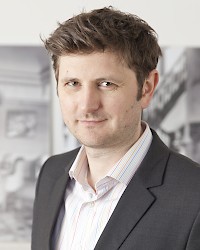Vita
Wladimir Velminski, born 1976, has been coordinating the research project “Gedankenwürfe. Kybernetische Denksysteme und ihre Zirkulation zwischen Wissenschaft, Politik und Öffentlichkeit” at ETH Zürich since 2011. He studied mathematics, physics as well as media and Slavic studies at Humboldt-Universität zu Berlin and Lomonosov University in Moscow. From 2002 to 2006, Velminski was a research associate in the project “Bild Schrift Zahl”, directed by Friedrich Kittler, at the Hermann von Helmholtz-Zentrum für Kulturtechnik, Humboldt-Universität zu Berlin. From 2006 to 2007, he directed the project “mathesis & graphé. Leonhard Euler – Im Paradies der Gelehrten”, which was part of the research project “Das Technische Bild”, managed by Horst Bredekamp, at the very same university. In 2007, Velminski took a position as researcher and lecturer at the Institut für Slawistik, Humboldt-Universität zu Berlin, where he gained his doctorate in 2008 with a dissertation entitled “Form Zahl Symbol. Leonard Eulers Strategien der Anschaulichkeit”. From 2009 to 2011, Velminski worked at the Slavisches Seminar, Universität Zürich, before being appointed as Researcher and Lecturer by ETH Zürich. In 2011, Velminski was awarded a Dilthey-Fellowship by Fritz Thyssen-Foundation, which he partly spent at the Medizinhistorisches Museum at the Charité Berlin. Apart from his academic appointments, Velminski has distinguished himself with two scientific films, among them LEONHARD EULER. IM PARADIES DER GELEHRTEN (2007), which was nominated as best European scientific film by the European Festival of Educational and Science Films.
Stand: 2015
Forschungsgebiete
Media studies; history of architecture and art history; history and theory of knowledge; Soviet art and literature.
Publikationen
Monographien
Diagnose: Krim. Kunst und Gewandtheit der Politik. Berlin: Merve Verlag 2014.
Gehirnprothesen. Praktiken des Neuen Denkens. Berlin: Merve Verlag 2012.
Ordnungssysteme 1700. Zeichenpraktiken und Machtstrategien in der russischen Frühaufklärung. Berlin: Kadmos 2010.
Form Zahl Symbol. Leonard Eulers Strategien der Anschaulichkeit. Berlin: Akademie Verlag 2009.
Herausgeberschaften
Hirngespinste. Denkprozesse zwischen Störung, Genialität und Fiktionalität. München: Wilhelm Fink 2013.
with Hans-Christian von Hermann: Maschinentheorien/Theoriemaschinen. Frankfurt a.M.: Peter Lang Verlag 2012.
with Horst Bredekamp: Mathesis & Graphé. Leonard Euler und die Entfaltung der Wissenssysteme. Berlin: Akademie Verlag 2010.
Sendungen. Mediale Konturen zwischen Botschaft und Fernsicht. Bielefeld: transcript 2009.
Artikel
“Chains of Chance: A Convoluted History of Pattern Recognition”. In: Nina Samuel (ed.): The Islands of Benoît Mandelbrot. Fractals, Chaos, and the Materiality of Thinking. New Haven: Yale University Press 2012, pp. 133-139.
“Homöoskopie des Kopfzerbrechens. Zu den Entwürfen der Denkökonomie um 1800”. In: Jutta Voorhoeve (ed.): Welten schaffen. Zeichnen und Schreiben als Verfahren der Konstruktion (=Wissen im Entwurf, 4). Zürich: diaphanes 2011, pp. 59-75.
“Psichion. Das Medium der Sowjetmacht”. In: Zeitschrift für Medienwissenschaft, 2/1, 2010, pp. 65-71.
